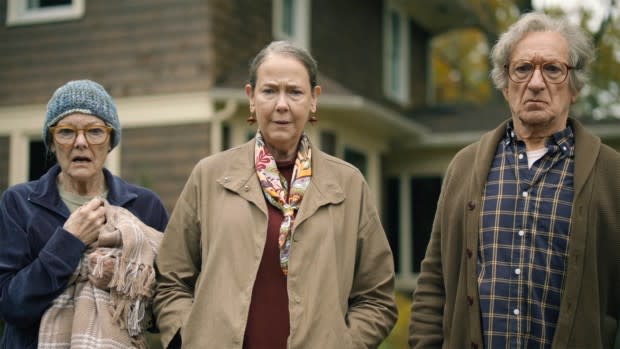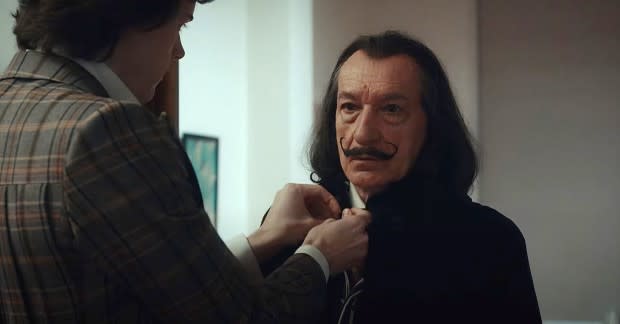Ben Kingsley Is Nearly Unrecognizable in His New Alien Movie 'Jules'
- Oops!Something went wrong.Please try again later.
- Oops!Something went wrong.Please try again later.

Sir Ben Kingsley, the Gandhi and Schindler’s List star, 79, adds another unique character to his impressive resume in the lighthearted and touching sci-fi dramedy Jules (in theaters Aug. 11). The film is the story of Milton (Kingsley), a widower living a quiet life in a small western Pennsylvania town, whose existence is turned upside down by the arrival of a UFO and its passenger. Milton would choose to ignore the space craft in his backyard and its extra-terrestrial passenger, but for his two neighbors (Harriet Sansom Harris and Jane Curtin). The three lonely seniors form a bond of friendship through their efforts to help Jules (the name bestowed upon the ET) safely return home.
Parade sat down with Kingsley to discuss his new film and storied career.
Walter Scott: This movie is hard to classify. When you first read the script, what was your impression?
Sir Ben Kingsley: It is quite difficult to put it into a box. When I first started to read the screenplay, I thought, Oh, this is a tragedy. This is like Shakespeare’s King Lear; this is heavy, dark stuff. And then I got to about page 11 and I went, Yikes! No, this is E.T., this is wonderful! And then further in there were some hilarious moments. Not overtly comedic but very funny because of the interaction of the characters and how they are surprised by the biggest ambush of their lives. That being this visit from—what I sometimes refer to as an angel—a very benign visit from the universe in the form of this delightful creature who enables everybody to be themselves, unbury themselves…almost unburden themselves to say things that they would rather not say or they feel that won’t be heard.
Nobody believes Milton because he has early symptoms of Alzheimer’s. The theme of this movie could be how accepting the unaccepted can lead to happy consequences. After seeing the film, if that’s what has settled in you, that is absolutely wonderful. Also, if there are many people in the cinema—and I really hope that people see this together because it is a film to be watched together—there will be many different impressions of the film that people will take away.
I know that some colleagues of mine who saw it say, “It was with me for days,” which is very interesting from a film that basically doesn’t have very many moving parts. It’s a very simple film, and yet because of its simplicity, and to a certain extent its purity, it does tend to stay with the viewer. And it is hilariously funny. And it has some very solemn and very touching moments, too.
How do you feel about Milton himself?
Well, I think as an acting exercise, it’s very intriguing because the actor—surprise, surprise—devotes his life to being visible. The actor has to be visible in order to survive, but at the same time, Milton is almost invisible. People don’t remember his name, people never listen to his speech at the city council meetings, or if they do, they’ve heard it all before. There is an invisibility about him. I know it sounds odd, but I found that very interesting and very attractive that I could disappear, because I don’t look like me in the film.

Bleecker Street
No, you don’t.
I took a real delight in echoing Milton’s invisibility by making me—ego me—invisible, too. And I did find that rather thrilling to completely subsume myself and find something quiet and reserved and modest. It was wonderful to play a man to whom life happens rather than be a man who makes things happen, like the historical figures I’ve played.
Why is your character Milton resistant to naming Jules?
He says, “He’s just here, I don’t need to call him anything.” I love that line and it’s always been a slightly mysterious line to me, but [I think it means] because he’s there, I don’t need to label him. I don’t need to interact by calling attention to him, we’re both just here. I think it’s part of Milton’s very limited and very precise modesty about life. Don’t show off. Don’t have a label. Don’t stick your head above the parapet. And then, of course, this amazing thing happens to him.
You were recently in Dalíland, in which you play Salvador Dalí. It had to be an180-degree jump into the shoes of Milton vs. a genius like Dalí.
Dalí came before Milton. So, Salvador Dalí was absolutely determined to be visible, signing his name almost on the Earth’s surface, signing his name wherever he could. Literally, there’s a wonderful scene in the film where he signs and signs and signs, leaving his mark on the world. Milton is the complete opposite, and what a wonderful and extraordinary opportunity to have those two roles almost back-to-back.
And I think that because of having played Salvador Dalí, I was able to allow myself to be invisible as Milton. All that ego need for me as an actor to be visible was spent in Dalí. And then by a wonderful serendipity, I was offered the polar opposite, and I thought, You have no need to be visible in this performance, just serve the character. I’m so grateful for the balance.

Magnolia Pictures
Did playing Dalí inspire you to paint or were you already a painter?
I have painted a little bit. But actually, my relationship with Dalí was I was the portrait painter, and I was creating a portrait of Dalí [in the film]. So, in a sense it inspired me to be a portrait artist, which was a very interesting and wonderful journey.
You have commented that being a film actor is more like being a portrait painter than being in theater.
Yes. When I was on stage as a theater actor, the analogy would be a landscape painter, and now that I’m a cinema actor, the parallel would be a portrait artist. So, in painter terms, I’ve gone from creating landscapes on stage to portraits on camera.
You’ve played several Jewish roles. Simon Wiesenthal in Murderers Among Us: The Simon Wiesenthal Story, Meyer Lansky in Bugsy, Itzhak Stern in Schindler’s List, Moses in Moses, Otto Frank in Anne Frank: The Whole Story. Several of those are Holocaust stories. Do you feel a pull to those somehow?
I must answer very candidly, and it’s an answer that disturbs me but it’s the truth. I remember as a schoolboy watching a wonderful television documentary series, which examined World War II. And as a schoolboy, alone in the house, I watched the liberation of Belsen [a Nazi concentration camp] on film. And I do remember as a young adolescent, I think I was maybe 11 or 12—this was way after World War II, of course, it was a retrospective—but I think my heart stopped beating for a little while. I went into deep shock as a child.
Related: 15 Moving Movies and TV Shows About The Holocaust for Holocaust Remembrance Day
The disturbing part of this story is that I remember within the same few days having a conversation with my maternal grandmother, who was inexplicably but quite vigorously antisemitic. So, the two impressions came to me almost simultaneously, and as a child it was very difficult for me, impossible for me to counter my grandmother’s outburst, but I think a seed was planted in me that said to me, “One day I will speak.”
Do you think it was your study of theater and Shakespeare that led to your success in film?
Certainly, I could never have approached the beautiful challenge of playing Mahatma Gandhi without having played Hamlet; without having played great Shakespearian roles, and without having 13-14 years’ experience in classical theater with the National Theater, the Royal Shakespeare Company.
I remember when I was promoting Gandhi somebody at the party said, “Where did they find you?” As if they might have found me at a checkout counter somewhere. And I couldn’t gather myself together to say, “I have had 14 years performing in classical theater.” Honestly, I could never have approached that great role without the extraordinary experience of stretching every cell of my mind and body to accommodate the great Shakespearian characters. Richard Attenborough, who directed Gandhi, saw my Hamlet, and it was that connection that allowed me to join him for my first feature film.
You’re also part of the Marvel universe. How gratifying is it to watch the fan reaction to your role as Trevor Slattery?
It’s now my fourth visit to Trevor. First in Iron Man 3, then All Hail the King, which was the short film made as a spinoff, then Shang-Chi, and now this series [Wonder Man]. So, I don’t think I’ve ever had an opportunity to revisit a character for the fourth time. And he’s changed from the rather druggie, alcoholic chap we met in Iron Man 3 to somebody much more sober now. Marvel is a great team to work with so I’m very happy to revisit Trevor.
Related: Everything We Know About the MCU Wonder Man Series — Cast, Story Details and More
Is there anything left that you want to accomplish that you haven’t done yet?
I think it will ambush me. I think that life ambushes you with something and you think, How have I lived this long without that? Or I can’t predict what it will be, but I think I will recognize it when it comes and say, There you are. Rather like Milton said to Jules [in the movie], “There you are.”
Watch Jules in theaters starting August 11, 2023.
*Interview done in June 2023 before the SAG/AFTRA strike
Next, We Ranked the 101 Best Thrillers of All Time, From 'Psycho' to 'Parasite'
